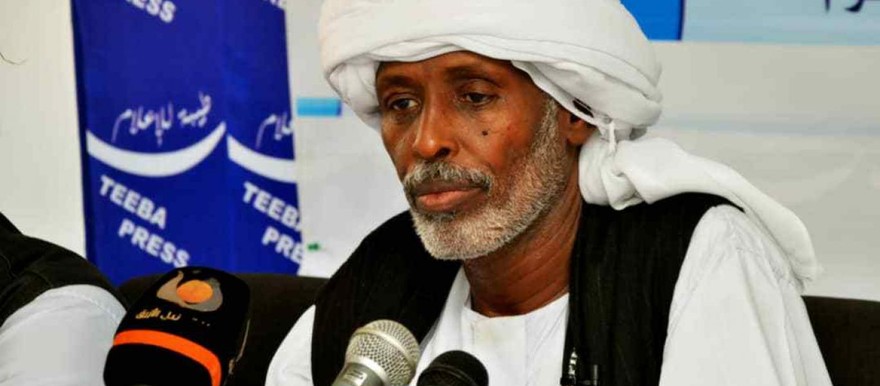Eastern Sudan Beja Nazirs repeat calls for self-rule

Sayed Tirik, head of the mainstream High Council of Beja Nazirs and Independent Chieftains (social media)
The head of the High Council of Beja Nazirs and Independent Chieftains, Sayed Tirik, has again threatened to announce self-determination for Red Sea state, Kassala, and El Gedaref, if the government in Khartoum does not respond to their demands for a separate platform on governance and development in eastern Sudan.
In his address to supporters in the area of Moweeta, north of Kassala, on Sunday, Nazir* Tirik described the Framework Agreement signed by the military junta and a number of civilian opposition groups last month, as a setback for Sudan’s independence.
The agreement was imposed on the Sudanese by foreign stakeholders, he said, and called for “a round table for all Sudanese to reach an agreement on which all the people of Sudan will agree”.
Tirik further said he refuses to join dialogue workshops organised by the Forces for Freedom and Change (FFC) in the name of eastern Sudan to reach a final agreement with the military, and threatened again to announce self-rule for eastern Sudan.
He announced that he plans “to lead a broad alliance that will bring together the north, the centre, and the south of Sudan, and all the oppressed in the country”, with the purpose of establishing “a genuine Sudanese federation” and added that “We reject any rule coming from Khartoum”.
The Beja leader further affirmed his support for “the armed forces and other regular forces”.
Framework agreement
On December 5, more than 40 parties, movements, and professional groups signed the Framework Agreement with the military at the Republican Palace in Khartoum. The agreement stipulates full civilian authority at all levels, and a Security and Defence Council headed by the Prime Minister.
This agreement is to be followed by a Final Agreement, after which a civilian government of technocrats will be formed to govern the country until general elections are held.
Five important though thorny issues still have to be discussed before this final agreement can be reached: justice and transitional justice, security and military reform, empowerment** removal, possible amendments to the Juba Peace Agreement, and governance issues regarding eastern Sudan.
On Friday, the mainstream High Council of Beja Nazirs and Independent Chieftains, headed by Tirik, and the Eastern Sudan Coordination Council announced that they will escalate their protests against the Framework Agreement in Kassala and Red Sea state.
In a press statement after a meeting of the Beja Council and the Coordination Council on Thursday, Tirik announced “mass mobilisation throughout the region, starting from Sunday, in protest against the Framework Agreement and to demand self-determination for eastern Sudan.
Split
The High Council of Beja Nazirs and Independent Chieftains witnessed a rift this summer when a faction opposed to Sayed Tirik made its own plans under the leadership of Abdallah Obshar, and announced the formation of committees to prepare for the right to self-determination, according to the stipulations of the Sinkat conference. Ibrahim Adarob became the chair of the new split-off faction, Obshar the spokesperson.
In mid-December, the AU-IGAD-UN Trilateral Mechanism mediating between the military and the opposition, invited the Adarob faction to participate in the upcoming Final Agreement negotiations. The Beja group refused as they had not been included in the previous stages.
Obshar told Radio Dabanga on December 23 that they instead demanded the implementation of agreements made with a UNITAMS delegation in October last year, which include the cancellation of the Eastern Sudan Protocol of the 2020 Juba Peace Agreement, the establishment of a negotiating platform on governance issues of eastern Sudan with the guaranteed involvement of the international community.
* A nazir is a state-appointed administrative chief of a clan, according to the native administration system in Sudan.
** Empowerment (tamkin) is the term with which the Al Bashir government supported its affiliates by granting them far-going privileges, including government functions, the setting-up of various companies, and tax exemptions.











 and then
and then